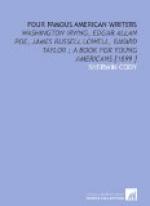“How many times have you sat at
gaze
Till the mouldering fire forgot to blaze,
Shaping among the whimsical coals
Fancies and figures and shining goals!
What matters the ashes that cover those?
While hickory lasts you can toast your
toes.
“O dream-ship builder! where are
they all,
Your grand three-deckers, deep-chested
and tall,
That should crush the waves under canvas
piles,
And anchor at last by the Fortunate Isles?
There’s gray in your beard, the
years turn foes,
While you muse in your arm-chair and toast
your toes.”
I sit and dream that I hear, as of yore,
My Elmwood chimneys’ deep-throated
roar;
If much be gone, there is much remains;
By the embers of loss I count my gains,
You and yours with the best, till the
old hope glows
In the fanciful flame as I toast my toes.
Lowell entered Harvard College when he was but fifteen years old, very nearly the youngest man in his class. In those days the college was small, there were few teachers, and only about fifty students in a class.
CHAPTER III
COLLEGE AND THE MUSES
Soon after he entered college, young Lowell made the acquaintance of a senior, W.H. Shackford, to whom many of his published letters of college life are addressed. Another intimate friend was George Bailey Loring, who afterward became distinguished in politics. To one or other of these men he was constantly writing of his literary ambitions, always uppermost in his mind.
Josiah Quincy was president of Harvard when Lowell was there, and afterward Lowell wrote an essay on “A Great Public Character,” which describes this distinguished president. In it he refers to college life in a way that shows he thoroughly enjoyed it.
“Almost every one,” he writes, “looks back regretfully to the days of some Consul Plancus. Never were eyes so bright, never had wine so much wit and good-fellowship in it, never were we ourselves so capable of the various great things we have never done.... This is especially true of college life, when we first assume the titles without the responsibilities of manhood, and the president of our year is apt to become our Plancus very early.”
In another of his essays he tells one of the standing college jokes, which is worth repeating. The students would go into one of the grocery stores of the town, whose proprietor was familiarly called “The Deacon.”
“Have you any sour apples, Deacon?” the first student to enter would ask.
“Well, no, I haven’t any just now that are exactly sour,” he would answer; “but there’s the bellflower apple, and folks that like a sour apple generally like that.”
Enter the second student. “Have you any sweet apples, Deacon?”
“Well, no, I haven’t any now that are exactly sweet; but there’s the bellflower apple, and folks that like a sweet apple generally like that.”




